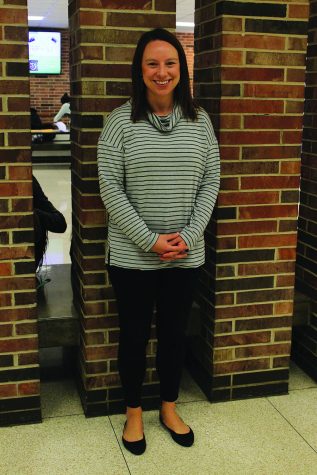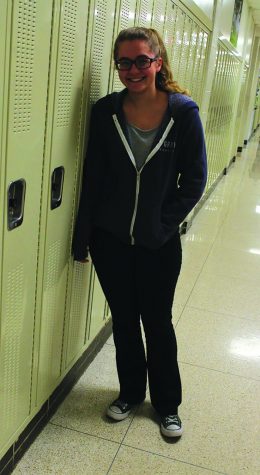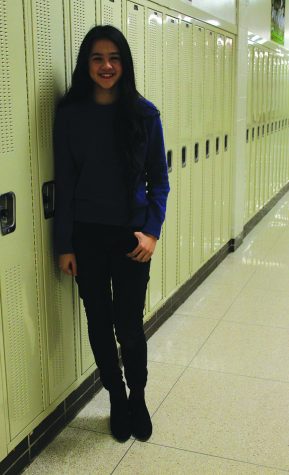Conquering College
As an increasing number of high school students apply to college each year, just as many diverse perspectives form about college. WSS examined some of these perspectives at West to redefine what a “dream school” really means.
Kelly Bergmann – Counselor

Throughout her career as a counselor, Kelly Bergmann has noticed a growing trend of perfectionism among high-achieving students toward college applications at West and the consequences and myths that come along with it.
“A lot of our kids are going for Ivy League schools. That’s [the] kind of the culture we live in,” Bergmann said. “A lot of the time, it’s the luck of the draw. Everyone has a bunch of fives on their [AP] exams, perfect scores on [SAT] subject tests; everyone has everything perfect. When it comes down to it, you can be perfect and still not get in.”
The idea of perfectionism has led students to think in a closed mindset, where they believe that a successful future lies only in going to their dream school. This mindset, along with the fear of failure, leads to students striving toward perfection in a variety of ways, such as spending hundreds of hours poring over test-prep books, pushing parents to shell out hundreds of dollars on expensive programs, and coordinating every action to what they believe an admissions officer would find appealing.
“I think now we’re living in this age where everyone wants to have a tutor, and they feel like if they don’t score anywhere from a 30 to 34, somehow, they’re a bad test-taker and they’re never going to get into college,” Bergmann said.
This mindset can lead to other harmful effects, such as excessive competition and stress, especially with West’s tradition of excellence.
“[West] has an extremely competitive academic environment. A kid can have a 3.9 and be ranked 200th in their class. That’s low, and that’s crazy because there’s absolutely nothing wrong with a 3.9. It makes you human,” Bergmann said. “I believe a little bit of competition is good, but when the norm is perfection, that’s where things get to be a little much.”
This can make what is mostly an independent process encompass the results of others, creating an environment of comparison and tension.
“It’s very nitty gritty. [Counselors] hear gossip a lot,” Bergmann said. However, during the application process seniors are usually full of stress, balancing their busy school coursework with auditions, essays, testing and extracurricular activities. At times, students may be overwhelmed and don’t know how to deal with the pressure.
“I think [stress] is generally healthy. When you’re stressing yourself out so much that it starts to hinder your quality of life, that’s when it starts to become bad,” Bergmann said. “Should you be a little stressed and anxious? Yes. But can you breathe? Can you focus? Are you having a good quality of life? That’s where the barrier is.”
Bergmann realizes that as a part of perfectionism in the college process, the numbers in the applications are extremely important. However, she recommends showing colleges the more human side of a person instead, observing that if everyone is trying to become perfect and are doing the same activities, everyone blends into the masses and no one truly stands out.
“A lot of the high school experience is pushing yourself academically and [finding] what also makes you you,” Bergmann said. “Everyone else is perfect, so stop trying to be perfect and be a good person, and show that you have something to give the school because of who you are, not what your grades or test scores are.”
One of the most important parts in showing the more human aspect is through recommendation letters. Bergmann emphasizes relationships—that when teachers and counselors write letters, the best letters they write are for students they genuinely know as a person through conversations, showing their interests and their personality rather than their grades.
“Just be a good person and we’ll notice that. We can tell a difference between the kids that … have this human aspect to them versus the kids that are 4.0 perfect for this, tutor for that. We see those things. That’s what [sets] you apart from everyone else,” Bergmann said.
The combination of perfectionism, competition and stress comes into play the most during decision day, which can make or break a student’s aspirations.
“If some kids don’t get into the school they’ve been dreaming of forever, that’s a huge shot to what they feel like they’re going to be able to achieve going forward. It’s going to be really hard and they’re going to struggle for a long time,” Bergmann said. “People that you feel like you need to deliver the news to are going to love you no matter what.”
In the end, no matter the result, a successful future still lies within sight.
“There’s a plan out there for you and it doesn’t depend on the school you’re going to. A lot of the times it has nothing to do with who you are or what you’re capable of doing,” Bergmann said. “Talk to the people that you really love and know you well. Focus on the other things going good for you. It’s a school’s loss and another school’s gain.”
Lauren Ernst – Student

Just last year, more than 38,000 hopefuls from around the world applied to Stanford University, marking the record for the largest application pool in Stanford history. Only about two thousand were offered the coveted acceptance letter. It becomes no surprise that Stanford’s acceptance rate is the lowest out of all colleges in the U.S. at a mere 4.8 percent—enough to scare even the most qualified applicants.
However, this prospect didn’t prevent senior Lauren Ernst ’18 from applying early to her dream school, even in an extremely competitive environment. In hopes of making the cut, Ernst prepared since freshman year.
“I took the hardest classes available. Whenever there was an AP class, I took it,” Ernst said. “I think I took the courses that I enjoyed and at the same time were most challenging to me.”
Ernst has committed herself to five AP classes senior year, making it difficult at times to focus on applications. Additionally, the competitive and stressful environment among seniors during college applications can make it just as hard to focus. Ernst has experienced this firsthand on a day-to-day basis.
“I’ve talked to a couple of people and they’re like, ‘Well, if I don’t get in and this person does, I’m going to be kind of upset because I feel like we have very similar applications,’” Ernst said.
With tension among students, the demanding pressures of perfection and comparison can lead to secrecy, as acceptance letters can become the definition of success among high-achieving students today.
“I think some people don’t outwardly tell people because … if it’s your number one school and you don’t get in, then your confidence [is hurt],” Ernst said. “But then there’s people who are really excited about it, like me.”
In situations where students always pressure themselves to get the best grades, take the hardest classes for the sake of college or study for countless hours, Ernst has come to realize that essays, in fact, are one of the most important parts of the process but certainly not the easiest.
“A lot of the prompts are like, ‘Why this place?’ I’m like, ‘Well, it’s pretty and they have a good academic program, and that’s about it.’ That’s not going to be sufficient to get me in,” Ernst said.
With multiple essays to be written, Ernst has frequently had to look back on her life for the perfect idea. Along the way, she’s come to realize things she could have done differently in her underclassmen years.
“The only thing I regret is stressing out about grades. Learning for a grade sucks,” Ernst said. “Learning for the sake of learning and having fun … is so much better. I wish I had started out with that perspective in freshman year and hadn’t been so grade-centric.”
Zach Ring – Student
Around college application season, most high school students are stuck indoors at home, busily trying to finish the many applications for the multiple colleges they’ve applied for. It’s a whirlwind of essay writing, late nights, stress and procrastination. For one student however, college applications are a breeze.
Zach Ring ’18 has only applied to one school – the University of Iowa – and he won’t be applying to another. “I think the main reason for me was because there’s so many perks of going to the Iowa and what I want to do that it made sense to go to Iowa,” Ring said.
The benefits of having cheaper in-state tuition, access to the U of I’s new music building, the marching band and being a big fan of the Hawkeyes have all persuaded him that he didn’t need to waste time on applying to other places when he was sure the U of I was the right school for him.
“[The process] was very simple. I did one application and it was great. I’m accepted,” Ring said. “I know of some people who are applying to an insane amount of colleges and are stressed and taking up entire weekends just for college stuff. I kind of understand, but not really.”
Because of his light course load and being done with college applications, Ring devotes all of his free time to his extracurricular passions and what makes him happy.
“Extracurricular activities are the big thing for me, and it’s fantastic. The time people are putting into college apps, I’m putting into extracurriculars,” Ring said.
Being involved in many extracurriculars has helped Ring with deciding on his future career and eventually deciding on the U of I. Throughout his entire high school and junior high years, he has been an avid choir, show choir and band member. Because his mom is also a teacher, he’s combined both influences in wanting to become a choral director.
However, this wasn’t always the case. Like most students, Ring didn’t know what he wanted to do as a career for most of high school years. “College really hasn’t ever crossed my mind. For a long time, I’ve been really adamant on, ‘I’m a freshman and I shouldn’t know where I want to go for the rest of my life and so I’ve kind of been putting it off until senior year,’” Ring said.
At one point, he was sure of becoming a chemical engineer because he believed it was a stable job and provided good pay. It wasn’t until he decided to take a Futures class at West, a class designed to help students explore career options, that he made an important realization.
“I took Futures here as a senior, which is kind of weird because it’s mostly a freshman and sophomore class, but the class talked about how the majority of people don’t end up doing what they love. I love music and I didn’t want to end up in the majority for this so I decided to totally switch it up,” Ring said. “I dropped physics to add on AP Music Theory so I could get more prepared for college. Futures was definitely a rude awakening for me.”
Because Ring always focused on what he loved to do, grades and classes were never a big focus in his high school career, but he always believed in a mindset that his parents instilled into him. “It was more grades to my family, but I love [my family’s] mindset on this. It’s ‘we don’t care what grades you get as long as you’re trying your best’ and I think that’s the correct mentality to have because if you force your kids to have straight A’s they’re going to end up getting into great schools but even if your kids get straight B’s that’s still going to be good,” Ring said. “The lack of pressure to do my hardest in school made me much more appreciative of my role in school versus, ‘oh, you have to get an A’ because then I would feel miserable.”
In an academic and moral sense, Ring represents a stark contrast from the perfectionist applying to many elite colleges. “There are a vast amount of students who are like [the perfectionist] and who am I to say that’s good or not because you could end up having a lot of choices. However I personally feel like it’s a lot easier to say this school’s pretty neat and I’m going to just apply to this one,” Ring said. “Dream school for me would probably be Iowa. It sounds weird, but my entire life I’ve never been totally focused on colleges and part of that is I didn’t know what I wanted to do. And then I’m like, I have all these of perks of going to Iowa so I might as well do that. There are so many plus sides to it. I’m so ready for college.”
Yajatra Kulkarni – Student
To many students, the mere idea of studying abroad in a foreign country with no parents for a year can be an unimaginable thought. However, for Yajatra Kulkarni ’19, it is an opportunity that will soon become a reality.
It was just last year when Kulkarni found out about the Rotary International Student Exchange Program – a program that gives high school students the opportunity to apply for a chance to study abroad in a foreign country for one full academic year under a host family. He discovered the chance through a family friend, whose recent trip to Germany through Rotary convinced him to apply.
“[My friend] recommended I should go this year because it’s a good experience and it helps you to grow as a person. I decided to do it and I think my goal behind it is to develop a maturity for myself before I get into college and to explore. I’m hoping to get an adventure out of Rotary and learn about a new culture and language.” Kulkarni said.
No matter how fun the experience may seem, it wasn’t an easy decision for Kulkarni, as he realized he would have to overcome many challenges both physically and emotionally. One of the biggest hurdles would be having to graduate early and travel to go to school in the foreign country, where he wouldn’t know the language or anybody there at all.
“All of the classes will be in that language that they speak so I probably won’t learn anything and I think there will be a lot of frustration for me to try to comprehend what is going on,” Kulkarni said.
Not only will he have to keep up with the classwork in the foreign school, but he’ll also have to finish his college applications before his embarks on the trip at all, while keeping up with the challenging AP course load at West. That means he has to decide which colleges he wants to apply to already as an 11th grader and having to deal with the fact that colleges haven’t released their essay topics yet. Because he needs the topics this year, he will have to contact each individual college explaining his situation while gathering teacher recommendations, maintaining both his grades and extracurriculars, and preparing to live internationally.
“As I get closer to that deadline I’ll probably really start worrying about it because that’s when AP testing, finals, and writing college essays happens. It’s going to be a really really bad process,” Kulkarni said.
Another aspect that Kulkarni will have to prepare for is homesickness, one of the biggest problems for students that his Rotary training sessions have pointed out. Having always lived with his family and among his friends, taking this trip is a huge step for him. “I’ll definitely miss friends and family because the Rotary limits your access for social media,” Kulkarni said. “You’re not allowed to constantly talk to people at home because the goal of it is to talk to people you’re living with and learning new cultures. I think homesickness will happen but I’ll probably get over it pretty quickly.”
The training sessions that Rotary offers are not only to combat homesickness, but other issues that students may encounter by letting students spend the night for three days in a facility learning to encounter different trouble scenarios. However, what they won’t help with are the experiences that Kulkarni will possibly miss back at West High and at home.
“When you do something, there’s always something you miss out on doing. I think if I do this student exchange, I will definitely miss out on that entire year of high school experience in the U.S. I would be missing out on courses I would have wanted to take and I’d probably miss out on spending an extra year with my friends and family before going to college,” Kulkarni said. “I won’t get to spend time with my sister so that will kind of suck because she’s really young right now so I’ve often times thought about if she would forget who I was if I was gone for a year and came back. It’ll definitely create differences and gaps in communication between me and people that I care about which will suck, but I think the benefits and experiences I get out of doing the exchange will outweigh the regrets that I get.”
Going forth with this decision hasn’t been a total personal decision, after having the opinions of his loved ones influence how he felt on taking this leap. “My parents definitely supported me, but my friends aren’t necessarily supportive of it because I think a lot of them don’t see the point in doing student exchange … they think it’s a waste of money and I should just stay and not go,” Kulkarni said. “There were a couple of times where I think I kind of doubted myself for why I’m really doing it and if there was any point in spending the $6000 on going abroad than saving it for college but in the end it’s going to be worth it to go abroad so I’m sticking with it.”
As for anyone else who may be thinking about Rotary, Kulkarni has some advice. “You really have to set in your mind why you want to do the student exchange because if you … treat it like a vacation, it’s not worth doing. I think it’s going to be more work than play,” Kulkarni said. “Make sure you are willing to do it and don’t have regrets later because a year is a long time and it will be really painful. It might be frustrating at times, but you have to be willing to stick with it and it will turn out to be a really fun experience.”
Olivia Manaligod – Student

Music has touched the lives of many students. However, only a few are passionate enough about their instrument to pursue a music major and a career as a musician. Olivia Manaligod ’18 happens to be one of those students. With a strong philosophy dedicated toward pursuing her passions, she is applying to many voice and opera programs across the country in hopes of becoming a professional singer, despite the risks.
“It’s kind of something that’s really daunting, and not every performance major is successful. At the same time, if you want to perform and you really love music, you should definitely go after it,” Manaligod said. “I feel like you’re successful if you’re doing what you love.”
For Manaligod, applying early to her dream school of Northwestern University seemed most fitting, partly because of her unique legacy status. Even though having her grandfather, mother and brother as alumni is beneficial for her application, Manaligod is well aware that Northwestern is one of the most selective colleges in the country.
“I do feel a lot of pressure, especially when applying for voice programs and having so many talented people auditioning for the same things.” Manaligod said.
Regardless of how well a student’s vocals are, highly selective schools like Northwestern strongly emphasize academic rigor as well, which makes for a more competitive environment that Manaligod has already experienced close to home.
“There’s a lot of people at West who like Northwestern. Whenever I mention I’m interested in Northwestern, people are always like, ‘Oh, I like that one too,’” Manaligod said. “I don’t try to compare myself to the people who have higher academics than me … If they get into Northwestern and I don’t, I’ll be very happy for them because it’s a great thing and I don’t think it’ll really say anything about me as a performer and person.”
A huge part of the process in applying to many music schools is the audition in which students prepare their best work to perform at a scheduled regional audition on campus or to record and send online. Because most students view this audition as the gateway to their future, it can quickly become a high-stakes process.
“I’ve been constantly thinking about recording my auditions. It’s been really hard to schedule it because I need to have my teacher and accompanists there at the same moment, and I’m also balancing my schedule and all the other activities I do,” Manaligod said. “That’s scary to think about because what if you don’t get your tape done on time, or what if you don’t have enough time to improve it? … You want everything to be perfect.”
However, Manaligod has recognized that the challenges in auditions and applying to music programs have benefitted her by making her become more independent as a performer. The process represents a shift away from her experience of working closely with groups during the All-State process or rehearsing in musicals.
“When applying to colleges you have your support system, but you feel like it’s on you. I have my pianist and my teacher, but at the end of the day it’s really just about my voice,” Manaligod said. “[The process] makes you grow as a performer. You can’t rely on having others perform with you so I have to become more brave, but at the same time it’s still scary … to work with other people,” Manaligod said.
With the college application process near its end, Manaligod remains hopeful for her career as a musician, regardless of the results on decision day.
“I’m looking forward for this [process] to be over. While I do love the songs I’m singing, it’s just so scary. As soon as I’ve sent out all of my applications, it’s out of my hands. It’ll be less stress on my mind,” Manaligod said. “I think whatever is meant to happen will happen and I’ll always have second chances … I’ll be fine wherever I go because I’ll try to make the best of it.”
Your donation will support the student journalists of West High School. Your contribution will allow us to purchase Scholarship Yearbooks, newsroom equipment and cover our annual website hosting costs.

Jenna Wang is a senior at West High. It is her third year on staff and she is the Editorial Editor, Co-Copy Editor and a reporter for the print publication....



